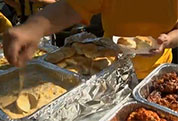- 8 Ways to Increase Dopamine Naturally
- 7 Best Breads for Maintaining Stable Blood Sugar
- Gelatin vs. Collagen: Which is Best for Skin, Nails, and Joints?
- The Long-Term Effects of Daily Turmeric Supplements on Liver Health
- Could Your Grocery Store Meat Be Causing Recurring UTIs?
- Are You Making This Expensive Thermostat Error This Winter?
- Recognizing the Signs of Hypothyroidism
- 10 Strategies to Overcome Insomnia
- Could Artificial Sweeteners Be Aging the Brain Faster?
- Techniques for Soothing Your Nervous System
Tailgating Tips for Food Safety


FRIDAY, Oct. 11When you’re planning your next tailgate party, be sure to think about food safety.
Some foods are almost always safe, including dry foods, those high in sugar, breads, rolls, cakes (without cream filling), fresh fruits and vegetables, cookies, and crackers, said Dianne Killebrew, a registered dietitian and certified health and wellness coach at Vanderbilt University Medical Center in Nashville, Tenn.
Other foods require more care. These include not only obvious items such as meat, eggs, poultry, fish, milk products, slaw, and pasta or potato salad, but also foods you might not think about, such as sliced melons, sliced tomatoes, potatoes, rice and tofu, Killebrew said in a Vanderbilt news release.
Marinate meat in the refrigerator prior to traveling and keep it chilled in a cooler until you grill it, Killebrew said. When transporting raw meat, tightly seal it in plastic wrap or zip bags to prevent juices from contaminating other food in your cooler. When you take food off the grill, put it on a clean platter — not back on the same one it was on when raw.
Cook ground beef, pork, lamb and veal to 160 degrees, and poultry to 165 degrees. Keep hot foods above 140 degrees. Cook only the amount of meat that will be eaten to avoid having to deal with keeping leftovers at a safe temperature.
Keep cold foods in a cooler with plenty of ice, icepacks or frozen gel packs, and check that food is at 41 degrees or lower using a thermometer, Killebrew said.
Throw out perishable food items before you enter the stadium. Food should not be left unrefrigerated for more than two hours, or one hour in hot weather.
Bring waterless hand sanitizer to keep your hands clean, as well as paper towels and disposable cloths or moist towelettes to clean surfaces.
More information
The U.S. Department of Agriculture has more about food safety.
Source: HealthDay
Copyright © 2026 HealthDay. All rights reserved.










